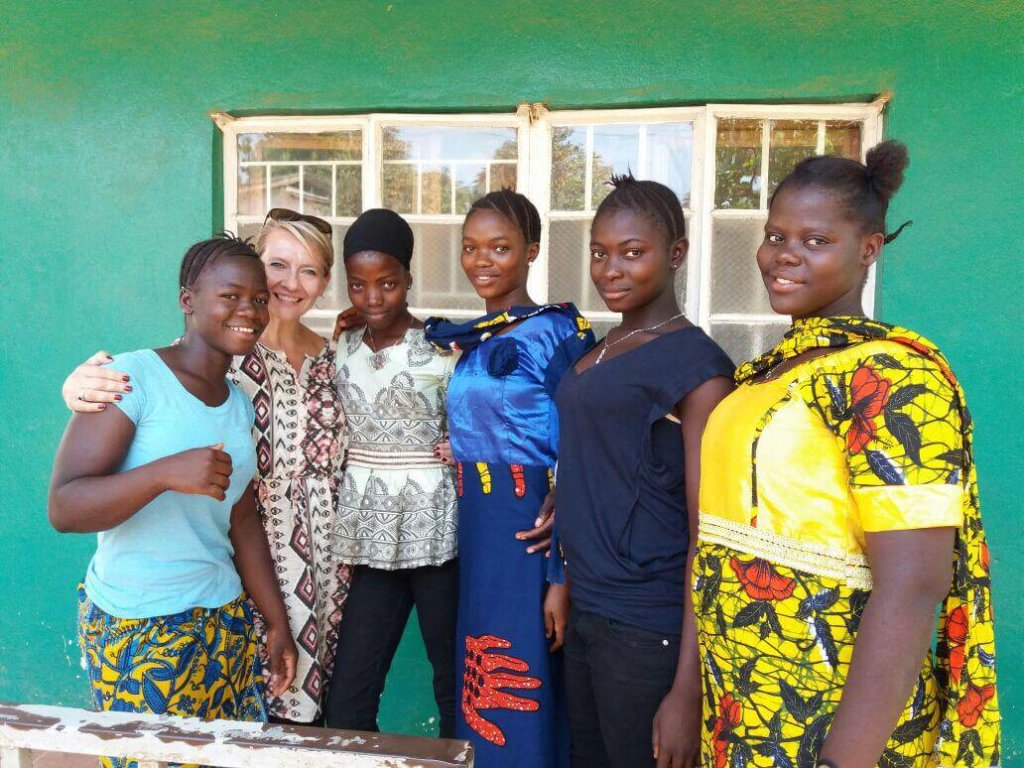
In Kabala, in the Koinadugu District of Sierra Leone, the trade route from the town to the nearby villages isn’t paved. Instead, its rich, reddish soil provides sharp contrast to the dark, lush green of the trees that grow along the path. People pass by every day, every hour. Farmers with their produce; mothers accompanied by their daughters, carrying lumber or vegetables to trade; and children, running. Depending on when you take the path, the rush of running water will mingle with the smells of food cooking, fires starting, or the chatter of those washing their laundry.
This path is a familiar one to Barb McIntosh, Deputy County Director for CAUSE Canada’s work in Sierra Leone. She’s walked it many an evening, after the day’s work is done. Spend a short while in conversation with her and you’ll realize that this path is also a place of memories in Barb’s life, memories that both content her and foster even greater determination and motivation for her work in girls’ education. In the same way that she’s seen the houses spring up around the trade route, she’s also borne witness to the growth that comes with increased education in the community.
“When we first moved into Kabala,” Barb recalls, “I remember meeting women who couldn’t write their own names. If their children were sick, they couldn’t read the prescription even if they had enough funds to get to the doctor.”
Although this came as a surprise to Barb, such low literacy was the norm for Kabala and the surrounding communities. In 2004, only a few years before Barb began her work with CAUSE Canada, roughly 30% of males were literate in the area. The number of literate women was half that rate. In other words, despite females making up almost exactly half of the population in the Koinadugu District, Sierra Leone’s largest and most impoverished region, only 3 in 20 women had any basic literacy.
Low literacy and numeracy skills in women impact not only their personal lives, but the lives of their family and community. While men are responsible mostly for working on the farm (agriculture being a primary source of income for many in and around Kabala), women are expected to bring in funds as well as run a household and provide for everyone under their roof. The best support of a mother is in her daughters. Traditional expectations define gender roles so early in children’s lives that young girls are expected to take care of younger siblings, while daughters old and strong enough work the fields or trade at the markets with their mothers. Boys, on the other hand, face few such expectations.
The need for literacy in Kabala was great, and so CAUSE Canada began a mother’s club for literacy and numeracy. Their work was embraced almost immediately by the women of the community, and gratification was quick.
On the same path that Barb still walks today, she remembers a woman calling out to her one evening. “Hey Barbara,” the mother shouted, and she spelled her name with joy. “My name is Mary! M-A-R-Y!”
Over a decade later, literacy rates among women of the Koinadugu District have risen to roughly 26%. Barb has been a part of CAUSE Canada’s continual and increasing support in education. CAUSE Canada has moved from sponsoring students in 3 schools, to 17 schools, and their support includes improvements in teachers’ education as well as the ever-loved mothers’ clubs. Yet the need is as great as ever.
Even as countries clamour to be the first to receive vaccines in the coming new year, COVID-19 will have left its marks on the uninfected.
Sierra Leone has handled the pandemic well, keeping case numbers low, although this is partly because of their experience with the Ebola outbreak only a few years prior. But the far-reaching effects of quarantine, reduced access to health and safety resources (especially for women) and reduced access to education, have so far meant increased gender-based violence and a resurgence in adolescent pregnancies. While just about all of CAUSE Canada’s sponsored students are back on track in their studies, there are still girls being kept at home, away from the opportunities that await them through the classroom.
Without education, their lives are predictable. With the investment of education, the returns are endless. Barb remembers many, having seen so many children benefit. One girl came from a family of 27 children. Being one of the youngest in her family, there was little priority on the completion of her schooling. However, with CAUSE Canada’s support, she stayed in school until she graduated as a teacher. Now, she works as a teacher and mentor for the young girls in her village. Another girl, Elizabeth, knows she would have been married with four or five children by now if not for her education. Instead, Barb saw her the other day. She was biking back on the path to her village to help the children there in their reading and writing. She’s almost finished her nursing degree.
There’s plenty of work still to be done. The pandemic is not the end, but it is an obstacle that needs the support of many to overcome. Although a path that builds education into the lives of many is still not the norm for the girls in Kabala, it’s one that is growing and flourishing year after year, and the outcome is one that holds great hope.
